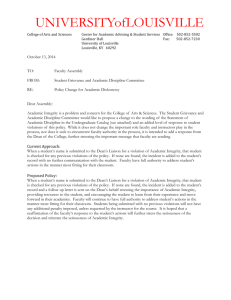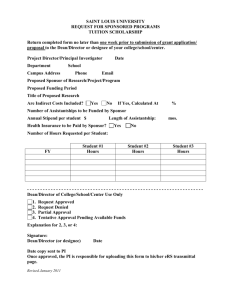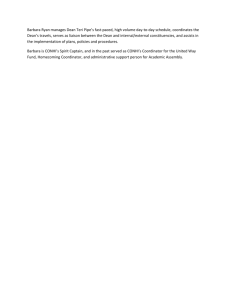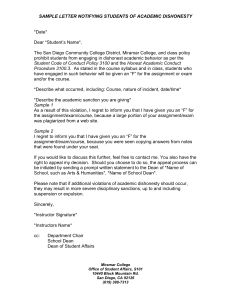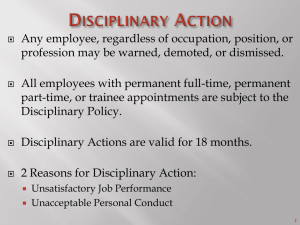Academic Integrity Code
advertisement
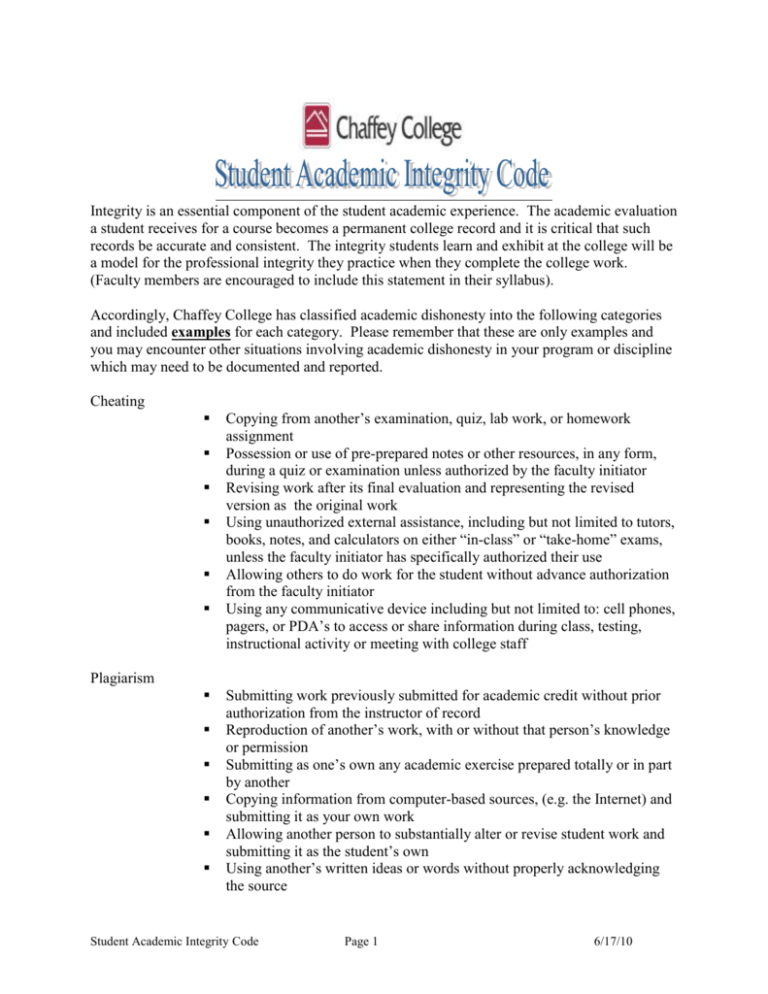
Integrity is an essential component of the student academic experience. The academic evaluation a student receives for a course becomes a permanent college record and it is critical that such records be accurate and consistent. The integrity students learn and exhibit at the college will be a model for the professional integrity they practice when they complete the college work. (Faculty members are encouraged to include this statement in their syllabus). Accordingly, Chaffey College has classified academic dishonesty into the following categories and included examples for each category. Please remember that these are only examples and you may encounter other situations involving academic dishonesty in your program or discipline which may need to be documented and reported. Cheating Copying from another’s examination, quiz, lab work, or homework assignment Possession or use of pre-prepared notes or other resources, in any form, during a quiz or examination unless authorized by the faculty initiator Revising work after its final evaluation and representing the revised version as the original work Using unauthorized external assistance, including but not limited to tutors, books, notes, and calculators on either “in-class” or “take-home” exams, unless the faculty initiator has specifically authorized their use Allowing others to do work for the student without advance authorization from the faculty initiator Using any communicative device including but not limited to: cell phones, pagers, or PDA’s to access or share information during class, testing, instructional activity or meeting with college staff Plagiarism Submitting work previously submitted for academic credit without prior authorization from the instructor of record Reproduction of another’s work, with or without that person’s knowledge or permission Submitting as one’s own any academic exercise prepared totally or in part by another Copying information from computer-based sources, (e.g. the Internet) and submitting it as your own work Allowing another person to substantially alter or revise student work and submitting it as the student’s own Using another’s written ideas or words without properly acknowledging the source Student Academic Integrity Code Page 1 6/17/10 Failure to acknowledge study aids such as Cliff’s Notes or common reference sources Unauthorized use of another person’s data in completing a computer exercise or other class work Fraud, copyright infringement and any other noncompliance of regulations and laws as set forth by the Federal Communication Commission (FCC), the Motion Picture Association of America (MPAA), any other guilds or unions within the radio, television, or motion picture industry and state, county, city, local laws, ordinances and other current governmental regulatory commissions in the entertainment and broadcast industries. Pirating and any other noncompliance of confidentiality statements such as those signed by students in the fields of fashion and interior design Unauthorized Collaboration Working with other students to do lab work, review books, or develop a presentation or report without permission from the faculty initiator to do so Making lab data available to a student who did not attend the lab Jointly calculating homework problems without permission from the faculty initiator to do so Having another’s help to rewrite a student paper Sharing sources for a take-home exam Working in a group on a lab assignment without permission from the faculty initiator to do so Working on online course homework, quizzes, tests or other projects without permission from the faculty initiator to do so Facilitating Academic Dishonesty Intentionally or knowingly helping or attempting to help another student to commit an act of academic dishonesty Giving unauthorized assistance to others during a test or evaluation, including allowing someone to copy a test or examination, or arranging with others to give or receive answers via signals Providing specific information about a recently given test, examination or assignment to a student who thereby gains an unfair advantage in an academic evaluation Impersonating another student in order to meet a course or graduation requirement Providing aid to another student, knowing such aid is expressly prohibited by the faculty initiator Preparing academic work to be presented as the work of another Signing in students other than oneself for class attendance Interference or Sabotage Persistently behaving in a manner that has an adverse effect on the academic performance of others Student Academic Integrity Code Page 2 6/17/10 Destroying, stealing, changing or damaging another’s work Falsifying lab results Citing or listing source material that was not used for research Falsifying, altering, or misstating the contents of documents or other materials related to academic matters, including but not limited to schedules, prerequisites, transcripts, attendance records or college forms Giving false reasons (in advance of the fact or after the fact) for failure to complete academic work Fabrication Retaliation Retaliation of any kind against a person who reports or provides information about suspected or alleged misconduct in good faith. SEXUAL HARASSMENT MUST BE REPORTED DIRECTLY TO HUMAN RESOURCES, 909-652-6532. Do not use these guidelines or form for sexual harassment. Standards of Due Process (See Behavior Code) Student Academic Integrity Code Page 3 6/17/10 ACADEMIC INTEGRITY REPORTING PROCEDURE When faced with a violation of student academic integrity, the faculty initiator should use the following steps: 1. Inform your School Dean via telephone or email as soon as possible of the academic integrity violation. This guideline is imperative if a student has been removed from class on a summary suspension. If the student is hostile, contact the Campus Police immediately at (909) 652-6911 (emergency) or (909) 652-6632 (other business). Campus Police will then contact the Dean, Student Discipline/Grievance (909) 652- 6695. 2. As soon as possible following the violation, complete the Student Academic Integrity Form and attach student work or other documentation as appropriate. It is important to be as precise and detailed as possible in reporting the circumstances involved. Please note, the student will have the right to view all submitted documents pertaining to the violations. 3. Inform the student what action is recommended in regard to his/her academic integrity violation. If possible, have the student sign the Student Academic Integrity Form. 4. The faculty initiator sends the form to the appropriate Dean and keeps a copy of the form on file. 5. Prior to the next class period the student is expected to attend, the appropriate dean will contact the student to inform the student that a Student Academic Integrity Form has been received and to review the recommended action requested by the faculty initiator completing the form, implementing the action requested (if any) upon review. 6. Once the student has talked with the appropriate Dean and any action has been taken regarding the academic integrity violation, the appropriate dean will inform the student and the faculty initiator that this incident report is concluded. The Dean will also advise the student to review the Grievance Procedure as outlined in the Student Handbook. The appropriate Dean will also refer that incident report to the Dean, Student Discipline/Grievance and the student’s file will be updated accordingly. 7. Please be advised for your safety and knowledge the district also has safety training courses: http://www.csac-eiatraining.org/. Select “course catalog” and then select a category: Occupational Safety or Employment Law (violence in the workplace is under employment law). Once you have determined the course(s) your staff should complete, please forward a list of employees with Chaffey ID numbers and the course name to this office for course registration Student Academic Integrity Code Page 4 6/17/10 SANCTIONS Students who violate any standard of academic integrity shall be subject to the following disciplinary actions. The college may utilize any of the disciplinary actions set forth hereafter without previously using a lower-level of discipline. ORAL AND WRITTEN REPRIMAND: A student may receive an oral and written warning based on the level of severity of the violation. The oral and written warning is the least punitive sanction available under the Academic Integrity Code. The student will meet with the School Dean to address the violation. At that time, the School Dean may issue a warning to the student, which includes the discussion of a no-tolerance for recurrence of the violation and the potential penalty of suspension and/or expulsion. After the meeting with the student, a follow up letter is sent to the student by the Dean, Student Discipline/Grievance confirming the meeting and conversation. In addition, the Dean, Student Discipline/Grievance may also meet with the student and place a student on disciplinary probation. A copy of the letter is placed in the student permanent student service record. (Please see disciplinary probation for details). FAILING GRADE FOR ASSIGNMENT: Instructors should make sure all required assignments are mentioned in their course syllabus and that a weight has been assigned to each assignment in the syllabus so there will be no confusion over the consequences of a failing grade on a major assignment, as this may well lead to failing the course. Check with your department for a sample of appropriate language to include on your syllabus. FAILING GRADE IN COURSE: A failing grade on any assignment due to dishonesty may result in a failing grade for the course. Instructors should include exact language in the course syllabus about academic integrity policies and consequences. DISCIPLINARY PROBATION: Through the oral and written reprimand sanction, a student may be placed on disciplinary probation by the Dean, Student Discipline/Grievance. The duration of the probation may last up to two academic years. After the duration of the probation is complete, a student will revert to the status of good standing with the institution, unless a reoccurrence of a violation of the academic integrity code occurs. SUMMARY SCHOOL SUSPENSION: A student can be removed from the college for the day and the next class meeting. The appropriate college personnel shall complete a discipline or academic integrity form and immediately submit a copy to the student via mail, email or inperson. If the student removed is a minor, the College President/Superintendent or the President’s Designee shall ask the parent or guardian of the student to attend a parent conference regarding the removal as soon as possible. If requested, the college personnel who initiated the sanction shall attend the conference. During the period of removal, a student shall not return to the college without the concurrence of the Dean, Student Discipline/Grievance. RESTITUTION: A student may be subject to pay for or replace district property that was stolen or damaged due to the student’s violation. Arrangements for payment or replacement of damaged or stolen property will be established through the Student Services Office. Student Academic Integrity Code Page 5 6/17/10 SUSPENSION: The Superintendent/President or the President’s Designee may place a student on a fourteen (14) instructional day suspension pending requested disciplinary hearing from the student in order to protect lives, property or to ensure the maintenance of order. Designee may suspend a student from any or all classes and college activities for a period of time up to and including one or more terms for good cause. Whenever a minor is suspended, the Superintendent/President or the President’s Designee shall notify the parent or guardian in writing. Prior to imposition of suspension, or within fourteen (14) calendar days thereafter, the suspended student shall be afforded the opportunity to meet with the Superintendent/President or the President’s Designee to respond to the charges. EXPULSION: A student may be expelled by the Governing Board for good cause, to protect lives, property, or to ensure the maintenance of order when other means of correction fail to bring about proper conduct, or when the presence of the student causes a continuing danger to the physical safety of the student or others. Prior to imposition of expulsion, or within fourteen (14) calendar days thereafter, the expelled student shall be afforded the opportunity to meet with the Superintendent/President or the President’s Designee to respond to the charges. OTHER SANCTIONS: Nothing in this section shall be construed to prohibit the President/Superintendent or the President’s Designee from imposing a lesser disciplinary sanction than suspension or expulsion. A lesser sanction may include, but need not be limited to, verbal or written reprimands, probation, or ineligibility to participate in extracurricular activities. The Dean, Student Discipline/Grievance will institute administrative processes to ensure appropriate action will be reflected in the student’s institutional files including transcript and other records. Faculty should acquaint themselves with the Student Grievance Procedure. Grievances are divided into academic and non-academic categories. A student has six (6) months after the close of the semester or intersession in which the alleged violation occurred to file a formal grievance. If a student fails to file a grievance within six (6) months, he/she has forfeited his/her right to file a grievance for that alleged violation. Student Academic Integrity Code Page 6 6/17/10
